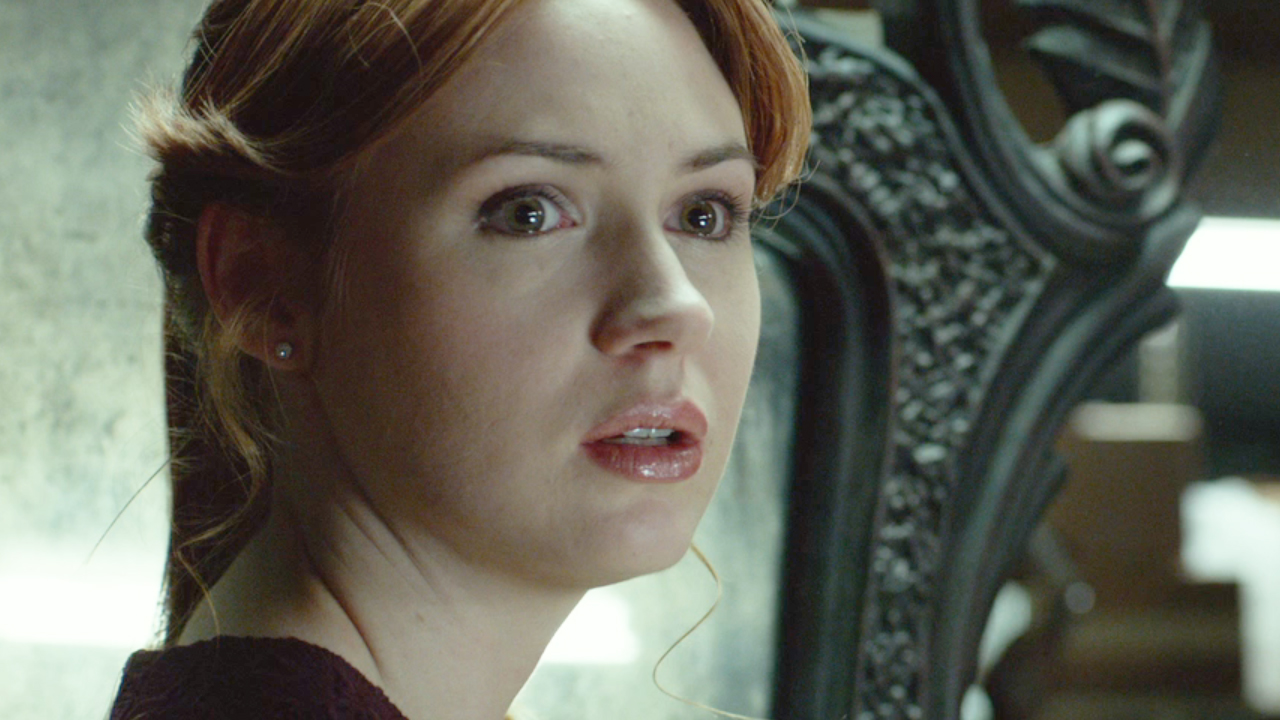The premise of Oculus is on its surface pretty stupid. Homicidal, supernatural mirrors don’t exactly make for compelling villains. Such is the ingenuity of writer Mike Flanagan’s screenplay. By shifting the mirror’s powers to the peripheral of a strong character study of a family slowly descending into madness, Oculus ripples with tension, mystery, and dread. Oculus somehow makes opulent mirrors, apples, and light bulbs all scary objects without coming off loopy.
The story begins on Tim Russell’s (Brenton Thwaites) 21st birthday. Tim has been released from a mental institution after coming to terms with the death of his parents (played by Rory Cochrane and Katee Sackhoff). He reconnects with his sister Kaylie (Karen Gillan) who gives Tim a surprise: she found the mirror she’s convinced killed their parents. She set up an elaborate science experiment involving the mirror to prove Tim and her innocence. However, the tests result in Tim and Kaylie living out their past lives (Annalise Basso plays young Kaylie and Garret Ryan plays young Tim) as they again watch the demons of their past arise again.
Oculus has some horror elements, but it is better classified as a psychological thriller. Like a mirror, the movie toys with what is real and what is not, leaving the audience confused as well. Fortunately, all versions of every character are well developed and organically conflicted: Tim’s time in the mental institution made him come to terms with his murder, which Kaylie believes to be brainwashing. Because of their reliance on memories, the parents’ descent can look differently depending on who is telling the story. As such multiple conflicts occur simultaneously, some involving personal demons and others dealing with past injustice. This way, when terror happens, we are scared for the people we have come to root for and care about.
Helping Oculus is the fact that most of the story can be explained without too much difficulty. Basic questions are dispensed with in clever structural ways, such as why they never tried to destroy the mirror. The experiment takes the power of the mirror seriously, placing multiple fail safes in place to eliminate the mirror after proving their innocence. The best idea in the Oculus screenplay is how easily explained the madness is. Time in the office can be explained as isolation, or hiding the fact that infidelity might be going on. In addition, their is an undercurrent of nefarious behavior from Kaylie and Tim; as time goes on, some of their decision making comes into serious question. Instead of focusing on the supernatural elements, Oculus could have been great if it used the mirror in a less supernatural way, focusing on tricks the mind plays on a person. As is, Oculus is a mostly logical realistic thriller that keeps the audience consistently guessing.
The acting has to be great for Oculus to succeed, and it is strong across the board. Karen Gillan, Brenton Thwaites, Annalise Basso, and Garrett Ryan are fantastic as the siblings. The younger siblings convey fear and loyalty very well. The older ones do wonders with the complexity of their current selves. Gillan’s determination is nice to see instead of a damsel in distress, and Thwaites is rightly confused by what he sees and what his mind knows. As dad, Rory Cochrane is cold and understated to unsettling effect, but Katee Sackhoff is the feared one here. She gets some truly distressing material that leads to a transformation very zombie like. Sackhoff’s sells the lifeless state she is in with aplomb, with terrifying results for the audience.
Horror movies usually hit the same beats to the point that they can be predicted very easily by the audience. Oculus fails to fall into line with wonderful results. The best compliment I can pay Oculus is by the time a character says “The Mirror did it!” you’re so wrapped up in the movie that you don’t laugh and feel upset that not one of the cops suspects the mirror. Come on, the mirror’s opulence alone is worth a second look.

